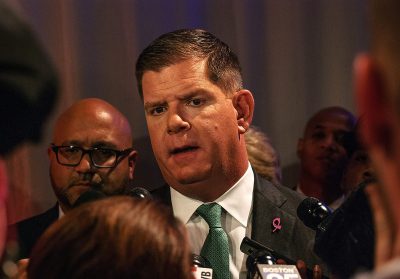
Boston Mayor Marty Walsh announced that he intends to reactivate the City’s Human Rights Commission on Aug. 26, focusing on protecting immigrant rights within the City of Boston.
Walsh said in a city press release that state and federal law both dictate all residents living in the U.S. should have access to the same basic services — regardless of immigration status.
“As attacks on human rights continue from the highest levels of our country, here in Boston, we’re committed to preserving and advancing human rights, including in our immigrant communities,” Walsh said in the press release.
Julia Mejia, Dorchester’s Boston City Council At-Large candidate, said to the Daily Free Press that as a result of the national climate, it is necessary to have a commission in place that recognizes the value of immigrants.
As an immigrant from the Dominican Republic, Mejia said she recognizes the need for these protections because was raised by a mother who was undocumented for a period of time.
“This is very dear to me,” Mejia said. So on a personal level, I think it’s about time,” Mejia said “… I think having an extra layer of protection gives me a sense of comfort knowing that the Commission exists.”
Mejia said that the commission should pay special attention to school enrollment documents and other documents that question families on their country of origin and may share this information with the U.S. Immigration and Customs Enforcement.
The Commission can conduct hearings, call witnesses and issue investigation reports. It also has the power to adopt rules and regulations as well as recommend legislation to the City Council and to Walsh, according to the press release.
Walsh’s press office wrote in an email that the Commission became inactive under a previous administration, but that Walsh is fully committed to “ensuring all residents of Boston have equal opportunities and equal rights.”
Walsh will appoint the seven-member body. Those individuals are to be announced, the email stated.
Walsh appointed Evandro Carvalho to be the commission’s executive director. Carvalho had previously served five years in the Massachusetts House of Representatives, representing Dorchester.
Born in Cape Verde, Carvalho immigrated to Dorchester at 15-years-old. Mejia said Carvarhlo was once her state representative in Dorchester. Emphasizing his background, she said that he understands the immigrant journey.
“It gives me great comfort knowing that someone who understands it through their life experience is going to be leading this initiative,” Mejia said.
Carvalho held community connections with Teen Empowerment and the Massachusetts Affordable Housing Alliance. As assistant district attorney, he prosecuted gun crimes in Boston.
“At this time in our country, I’m proud Boston has doubled down on our commitment to protect and advance the rights of all people,” Carvalho said in the press release. “I look forward to continuing to serve the people of our beautiful City in this new capacity.”
The Commission was established in 1984 by City ordinance and remained inactive since 1996. Its purpose intended to ensure fair and equal treatment of all residents.
Ari Grant-Sasson, 24, of Jamaica Plain, said immigration issues reach across the country.
“People are living in fear of deportation that didn’t begin with Trump and it doesn’t end in Boston,” Grant-Sasson said. “Very scary time.
Mary Ann Kopydlowski, 54, of Jamaica Plain, said that the commission should be composed of a diverse pool of members, from people of color to members of the working class.
“I mean, it needs to reflect the city of Boston, which is almost a majority minority now,” Kopydlowski said.
Alejandro Rubio, a 24-year-old student attending University of Massachusetts Boston and residing in Allston, is from Columbia and on a student visa.
Rubio said people from Latin America come to the U.S. for new opportunities, but obtaining a student visa can be a challenge. He said that America is a country of immigrants, as residents come from countries across the globe.
“All people, all around the world live here in America,” Rubio said. “… This country is for all people. It’s for all people, all people, not just for Americans.”






















































































































